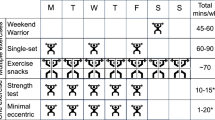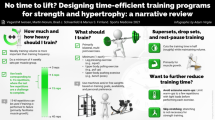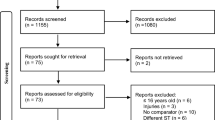Abstract
Objectives
Fortified milk and resistance training (RT) increase muscle mass, muscle strength, and physical performance in older adults, but it remains unclear whether RT combined with aerobic training (AT) would have stronger effects on these outcomes. The purpose of this study was to examine the effects of aerobic and resistance training (ART) combined with fortified milk consumption on muscle mass, muscle strength, and physical performance in older adults.
Design
Open-labeled randomized controlled trial. Setting: University of Tsukuba.
Participants
Fifty-six older adults aged 65-79.
Intervention
Participants were randomly allocated into resistance training (RT + fortified milk, n = 28) and aerobic and resistance training (ART + fortified milk, n = 28) groups. All participants attended supervised exercise programs twice a week at University of Tsukuba and ingested fortified milk every day for 12 weeks. Skeletal muscle index ([SMI]: appendicular lean mass/ height2) was assessed using dual-energy X-ray absorptiometry as a muscle mass measure. One-repetition maximum strength was measured using four kinds of resistance training machines (chest press, leg extension, leg curl, and leg press) as muscle strength measures. Sit-to-stand and arm curl tests were also assessed as physical performance measures.
Measurements
The primary measurements were muscle mass and strength. The secondary outcomes were physical performance, blood samples, habitual diet, habitual physical activity, and medication use.
Results
Although the muscle strength and physical performance measures significantly improved in both groups, SMI significantly improved in only the RT group. There was no significant difference in the change in SMI and muscle strength measures between the two groups. However, the change in sit-to-stand and arm curl measures in the ART group were significantly higher than those in the RT group.
Conclusions
These results suggest that AT before RT combined with fortified milk consumption has similar effects on skeletal muscle mass and strength compared with RT alone, but it may be a more useful strategy to improve physical performance in older adults. Although the mechanism of our intervention is uncertain, our program would be an effective prevention for sarcopenia in older adults.

Similar content being viewed by others
Abbreviations
- RT:
-
resistance training
- AT:
-
aerobic training
- RM:
-
repetition maximum
- RPE:
-
rated perceived exertion
- ART:
-
aerobic and resistance training
- SMI:
-
skeletal muscle index
- DEXA:
-
dual-energy X-ray absorptiometry
- HOMA-IR:
-
homeostasis model assessment-insulin resistance
- BDHQ:
-
brief-type self-administered diet history questionnaire
References
Cruz-Jentoft AJ, Baeyens JP, Bauer JM, Boirie Y, Cederholm T, Landi F et al. Sarcopenia: European consensus on definition and diagnosis: Report of the European Working Group on Sarcopenia in Older People. Age and ageing. 2010;39(4):412–23. doi:10.1093/ageing/afq034.
Janssen I, Heymsfield SB, Ross R. Low relative skeletal muscle mass (sarcopenia) in older persons is associated with functional impairment and physical disability. Journal of the American Geriatrics Society. 2002;50(5):889–96.
Janssen I, Baumgartner RN, Ross R, Rosenberg IH, Roubenoff R. Skeletal muscle cutpoints associated with elevated physical disability risk in older men and women. American journal of epidemiology. 2004;159(4):413–21.
Tanimoto Y, Watanabe M, Sun W, Sugiura Y, Tsuda Y, Kimura M et al. Association between sarcopenia and higher-level functional capacity in daily living in community-dwelling elderly subjects in Japan. Archives of gerontology and geriatrics. 2012;55(2):e9–13. doi:10.1016/j.archger.2012.06.015.
Tanimoto Y, Watanabe M, Sun W, Sugiura Y, Hayashida I, Kusabiraki T et al. Sarcopenia and falls in community-dwelling elderly subjects in Japan: Defining sarcopenia according to criteria of the European Working Group on Sarcopenia in Older People. Archives of gerontology and geriatrics. 2014;59(2):295–9. doi:10.1016/j.archger.2014.04.016.
Newman AB, Kupelian V, Visser M, Simonsick EM, Goodpaster BH, Kritchevsky SB et al. Strength, but not muscle mass, is associated with mortality in the health, aging and body composition study cohort. The journals of gerontology Series A, Biological sciences and medical sciences. 2006;61(1):72–7.
Bunout D, de la Maza MP, Barrera G, Leiva L, Hirsch S. Association between sarcopenia and mortality in healthy older people. Australasian journal on ageing. 2011;30(2):89–92. doi:10.1111/j.1741-6612.2010.00448.x.
Kim HK, Suzuki T, Saito K, Yoshida H, Kobayashi H, Kato H et al. Effects of exercise and amino acid supplementation on body composition and physical function in community-dwelling elderly Japanese sarcopenic women: a randomized controlled trial. Journal of the American Geriatrics Society. 2012;60(1):16–23. doi:10.1111/j.1532-5415.2011.03776.x.
Tieland M, Dirks ML, van der Zwaluw N, Verdijk LB, van de Rest O, de Groot LC et al. Protein supplementation increases muscle mass gain during prolonged resistance-type exercise training in frail elderly people: a randomized, double-blind, placebo-controlled trial. Journal of the American Medical Directors Association. 2012;13(8):713–9. doi:10.1016/j.jamda.2012.05.020.
Tieland M, van de Rest O, Dirks ML, van der Zwaluw N, Mensink M, van Loon LJ et al. Protein supplementation improves physical performance in frail elderly people: a randomized, double-blind, placebo-controlled trial. Journal of the American Medical Directors Association. 2012;13(8):720–6. doi:10.1016/j.jamda.2012.07.005.
Elliot TA, Cree MG, Sanford AP, Wolfe RR, Tipton KD. Milk ingestion stimulates net muscle protein synthesis following resistance exercise. Medicine and science in sports and exercise. 2006;38(4):667–74. doi:10.1249/01.mss.0000210190.64458.25.
Wilkinson SB, Tarnopolsky MA, Macdonald MJ, Macdonald JR, Armstrong D, Phillips SM. Consumption of fluid skim milk promotes greater muscle protein accretion after resistance exercise than does consumption of an isonitrogenous and isoenergetic soy-protein beverage. The American journal of clinical nutrition. 2007;85(4):1031–40.
Kukuljan S, Nowson CA, Sanders K, Daly RM. Effects of resistance exercise and fortified milk on skeletal muscle mass, muscle size, and functional performance in middle-aged and older men: an 18-mo randomized controlled trial. Journal of applied physiology (Bethesda, Md: 1985). 2009;107(6):1864–73. doi:10.1152/japplphysiol.00392.2009.
Rasmussen BB, Fujita S, Wolfe RR, Mittendorfer B, Roy M, Rowe VL et al. Insulin resistance of muscle protein metabolism in aging. FASEB journal: official publication of the Federation of American Societies for Experimental Biology. 2006;20(6):768–9. doi:10.1096/fj.05-4607fje.
Chevalier S, Gougeon R, Choong N, Lamarche M, Morais JA. Influence of adiposity in the blunted whole-body protein anabolic response to insulin with aging. The journals of gerontology Series A, Biological sciences and medical sciences. 2006;61(2):156–64.
Fujita S, Rasmussen BB, Cadenas JG, Grady JJ, Volpi E. Effect of insulin on human skeletal muscle protein synthesis is modulated by insulin-induced changes in muscle blood flow and amino acid availability. American journal of physiology Endocrinology and metabolism. 2006;291(4):E745–54. doi:10.1152/ajpendo.00271.2005.
Fujita S, Rasmussen BB, Cadenas JG, Drummond MJ, Glynn EL, Sattler FR et al. Aerobic exercise overcomes the age-related insulin resistance of muscle protein metabolism by improving endothelial function and Akt/mammalian target of rapamycin signaling. Diabetes. 2007;56(6):1615–22. doi:10.2337/db06-1566.
Rikli RE, and Jones C.J. Senior fitness test manual. Champaign: Human Kinetics; 2000.
Tanaka K, Takeshima N, Kato T, Niihata S, Ueda K. Critical determinants of endurance performance in middle-aged and elderly endurance runners with heterogeneous training habits. European journal of applied physiology and occupational physiology. 1990;59(6):443–9.
Kobayashi S, Murakami K, Sasaki S, Okubo H, Hirota N, Notsu A et al. Comparison of relative validity of food group intakes estimated by comprehensive and brieftype self-administered diet history questionnaires against 16 d dietary records in Japanese adults. Public health nutrition. 2011;14(7):1200–11. doi:10.1017/s1368980011000504.
Kobayashi S, Honda S, Murakami K, Sasaki S, Okubo H, Hirota N et al. Both comprehensive and brief self-administered diet history questionnaires satisfactorily rank nutrient intakes in Japanese adults. Journal of epidemiology /Japan Epidemiological Association. 2012;22(2):151–9.
Oshima Y, Kawaguchi K, Tanaka S, Ohkawara K, Hikihara Y, Ishikawa-Takata K et al. Classifying household and locomotive activities using a triaxial accelerometer. Gait & posture. 2010;31(3):370–4. doi:10.1016/j.gaitpost.2010.01.005.
Ohkawara K, Oshima Y, Hikihara Y, Ishikawa-Takata K, Tabata I, Tanaka S. Real-time estimation of daily physical activity intensity by a triaxial accelerometer and a gravity-removal classification algorithm. The British journal of nutrition. 2011;105(11):1681–91. doi:10.1017/s0007114510005441.
Masse LC, Fuemmeler BF, Anderson CB, Matthews CE, Trost SG, Catellier DJ et al. Accelerometer data reduction: a comparison of four reduction algorithms on select outcome variables. Medicine and science in sports and exercise. 2005;37(11 Suppl):S544–54.
Troiano RP, Berrigan D, Dodd KW, Masse LC, Tilert T, Mc Dowell M. Physical activity in the United States measured by accelerometer. Medicine and science in sports and exercise. 2008;40(1):181–8. doi:10.1249/mss.0b013e31815a51b3.
Ogasawara R, Sato K, Matsutani K, Nakazato K, Fujita S. The order of concurrent endurance and resistance exercise modifies mTOR signaling and protein synthesis in rat skeletal muscle. American journal of physiology Endocrinology and metabolism. 2014;306(10):E1155–62. doi:10.1152/ajpendo.00647.2013.
Zempo H, Tanabe K, Murakami H, Iemitsu M, Maeda S, Kuno S. ACTN3 polymorphism affects thigh muscle area. International journal of sports medicine. 2010;31(2):138–42. doi:10.1055/s-0029-1242808.
Roth SM, Zmuda JM, Cauley JA, Shea PR, Ferrell RE. Vitamin D receptor genotype is associated with fat-free mass and sarcopenia in elderly men. The journals of gerontology Series A, Biological sciences and medical sciences. 2004;59(1):10–5.
Ryall JG, Schertzer JD, Lynch GS. Cellular and molecular mechanisms underlying age-related skeletal muscle wasting and weakness. Biogerontology. 2008;9(4):213–28. doi:10.1007/s10522-008-9131-0.
Perrini S, Laviola L, Carreira MC, Cignarelli A, Natalicchio A, Giorgino F. The GH/IGF1 axis and signaling pathways in the muscle and bone: mechanisms underlying age-related skeletal muscle wasting and osteoporosis. The Journal of endocrinology. 2010;205(3):201–10. doi:10.1677/joe-09-0431.
Schaap LA, Pluijm SM, Deeg DJ, Harris TB, Kritchevsky SB, Newman AB et al. Higher inflammatory marker levels in older persons: associations with 5-year change in muscle mass and muscle strength. The journals of gerontology Series A, Biological sciences and medical sciences. 2009;64(11):1183–9. doi:10.1093/gerona/glp097.
Manini TM, Clark BC. Dynapenia and aging: an update. The journals of gerontology Series A, Biological sciences and medical sciences. 2012;67(1):28–40. doi:10.1093/gerona/glr010.
Clark BC, Manini TM. Sarcopenia =/= dynapenia. The journals of gerontology Series A, Biological sciences and medical sciences. 2008;63(8):829–34.
Sousa N, Mendes R, Abrantes C, Sampaio J, Oliveira J. Effectiveness of combined exercise training to improve functional fitness in older adults: A randomized controlled trial. Geriatrics & gerontology international. 2014;14(4):892–8. doi:10.1111/ggi.12188.
Morley JE, Argiles JM, Evans WJ, Bhasin S, Cella D, Deutz NE et al. Nutritional recommendations for the management of sarcopenia. Journal of the American Medical Directors Association. 2010;11(6):391–6. doi:10.1016/j.jamda.2010.04.014.
Author information
Authors and Affiliations
Corresponding author
Rights and permissions
About this article
Cite this article
Osuka, Y., Fujita, S., Kitano, N. et al. Effects of aerobic and resistance training combined with fortified milk on muscle mass, muscle strength, and physical performance in older adults: A randomized controlled trial. J Nutr Health Aging 21, 1349–1357 (2017). https://doi.org/10.1007/s12603-016-0864-1
Received:
Accepted:
Published:
Issue Date:
DOI: https://doi.org/10.1007/s12603-016-0864-1




